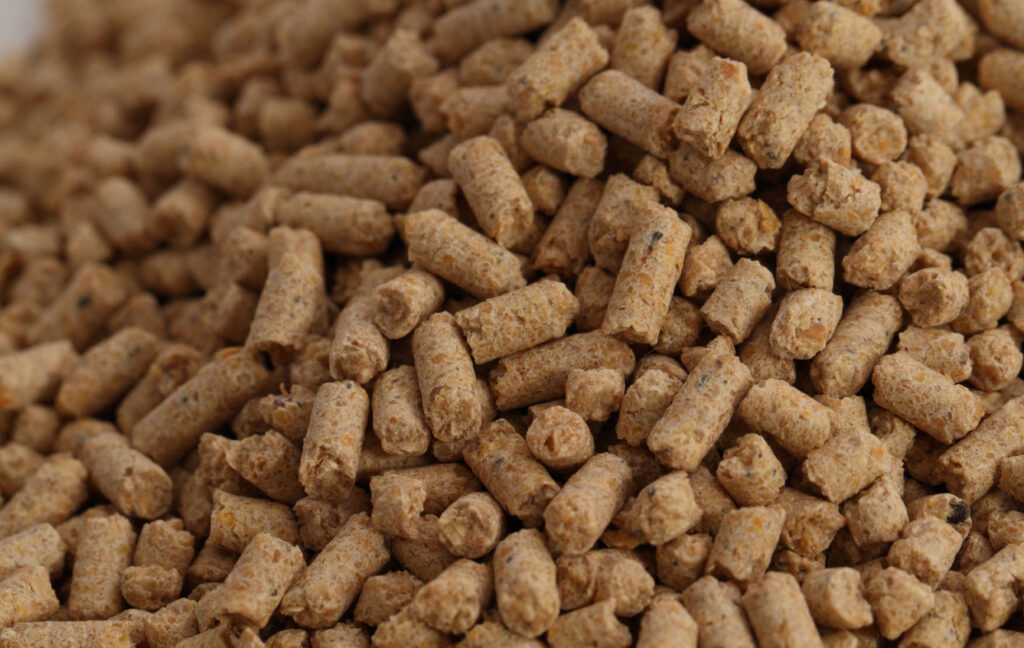
Maximizing Feed Efficiency for Poultry Farms
Understanding feed efficiency is crucial for poultry farmers as it directly impacts the profitability and sustainability of their operations. The feed conversion ratio (FCR) is a key metric that indicates how effectively birds can convert feed into weight gain. A lower FCR signifies efficient feed utilization, reduced waste, and increased profits. At AgValue Consulting, we specialize in poultry farm consulting and understand the significance of maximizing feed efficiency.
By managing feed waste through proper feeder adjustments and the use of pelleted feed, farmers can optimize their operations. A balanced diet, precise feeding schedules, and strategic incorporation of feed supplements can further enhance efficiency and productivity. Additionally, providing clean water and high-quality feed is essential for maximizing productivity and profitability in poultry farming.
As experts in the poultry farm consulting field, we guide farmers to implement practices that improve feed efficiency, enhance bird health, and foster a sustainable future. Our expertise and knowledge can help farmers navigate the complexities of poultry farming, ultimately leading to increased success and profitability in their operations.
Key Takeaways
- Enhance feed efficiency by providing balanced nutrition that supports growth and boosts the immune system.
- Minimize feed waste by adjusting feeder height and using pelleted feed.
- Optimize feeding times, mainly feeding early in the morning when chickens are most active.
- Use feed supplements to improve productivity and fill nutritional gaps.
- Maintain feed quality and clean water supply, and adopt holistic farm management to maximize feed efficiency.
Understanding Feed Efficiency
To maximize your poultry farm’s productivity, it’s vital to understand what feed efficiency is and how it impacts overall operations. Feed efficiency, also known as Feed Conversion Ratio (FCR), measures how efficiently your poultry can convert feed into weight gain. It’s a critical indicator of your farm’s profitability, as lower FCR values imply better feed utilization and, hence, lower feed costs per unit of poultry product.
You calculate FCR by dividing the amount of feed consumed by the weight gain of your poultry. For example, if your chickens consume 2kg of feed and gain 1kg in weight, the FCR is 2. The goal is to achieve a lower FCR, which suggests that your birds are converting feed more efficiently and are thus more profitable.
Importance of Balanced Nutrition
Ensuring your poultry gets balanced nutrition is essential to improving their feed efficiency and overall health. Without proper nutrition, your birds won’t develop optimally and you’ll see a decline in your farm’s productivity.
Now, here are four reasons why balanced nutrition is of utmost importance:
- Improved Growth and Development: A balanced diet supports the growth and development of your poultry. They’ll reach market weight faster, saving you time and resources.
- High Egg Production: For laying birds, optimum nutrition increases egg production. Your hens will lay more eggs, boosting your farm’s profitability.
- Disease Prevention: A well-fed bird is a healthy bird. Balanced nutrition boosts the immune system, reducing susceptibility to diseases.
- Lower Mortality Rate: Proper nutrition reduces the chances of mortality in your flock. This means you’ll maintain a high number of productive birds, which is essential for your farm’s success.
Managing Feed Waste
While maintaining a close eye on your flock’s nutritional needs, you should also focus on minimizing feed waste to further increase your farm’s efficiency. With feed accounting for a significant portion of your operational costs, reducing feed waste can directly impact your farm’s profitability.
Start by checking your feeders. If they’re too high, poultry may scatter feed, leading to waste. Confirm feeders are at the correct height for your birds, and regularly adjust as they grow.
Second, consider the type of feed. Pelleted feed tends to generate less waste than mash, as it’s harder for birds to scatter. You’ll have to weigh the cost difference, but it may be worth the switch.
Optimizing Feeding Times
Another crucial strategy to maximize feed efficiency is fine-tuning your feeding schedule. It’s not just about what your poultry eat, but when they eat it. Carefully managing feeding times can greatly enhance your birds’ growth rates and overall health, while also reducing waste and saving you money.
Here are four ways you can optimize feeding times:
- Feed early in the morning: Chickens are most active early in the day, so feeding them first thing can guarantee they’re getting the nutrients they need to stay healthy and productive.
- Don’t overfeed in the evening: Overfeeding can lead to waste, as chickens are less active at night and won’t eat as much. Instead, give them just enough to meet their nutritional needs.
- Monitor feeding times: Pay close attention to when your chickens are most hungry and adjust feeding times accordingly. This can help you avoid overfeeding and reduce waste.
- Implement a consistent schedule: Chickens thrive on routine. Feeding them at the same times each day can help regulate their digestive systems and improve overall health.
Benefits of Feed Supplements
In addition to maximizing feeding times, incorporating feed supplements into your poultry’s diet can greatly enhance their productivity and health. These supplements are a valuable tool to maximize feed efficiency, providing essential nutrients that regular feed might lack.
Feed supplements come in a variety of forms such as vitamins, minerals, amino acids, and probiotics. They’re designed to fill nutritional gaps and enhance the overall well-being of your birds. By adding these supplements, you’re not only promoting peak growth but also improving egg production and shell quality. They can also help reduce feed waste, as a healthier bird is likely to utilize feed more efficiently.
It’s important, however, to use them carefully. Overuse can lead to nutrient imbalances that may harm your poultry. That’s why it’s crucial to understand the specific needs of your flock and adjust their diet accordingly. Consulting with a veterinarian or a poultry nutritionist can be beneficial to make sure you’re using the right feed supplements in the correct amounts.
Impact of Birds Health on Feed Efficiency
Now, let’s consider how the health of your birds directly influences their feed efficiency. There’s a strong correlation between the two, and understanding this relationship can help you boost efficiency and profitability.
- Disease: Illness can drastically reduce feed efficiency. Birds that are sick often eat less and absorb nutrients poorly, resulting in wasted feed and decreased growth rates. Regular health check-ups and vaccinations are essential to prevent diseases and maintain ideal feed efficiency.
- Stress: Stressful conditions—whether due to overcrowding, poor ventilation, or rough handling—also affect feed efficiency. When stressed, birds consume more feed but don’t gain weight proportionately. Hence, it’s important to provide a stress-free environment.
- Genetics: The breed of your birds matters, too. Some breeds have inherently better feed conversion rates than others. It’s beneficial to choose breeds known for their feed efficiency.
- Parasites: Parasitic infections can significantly lower feed efficiency. Parasites compete with the host bird for nutrients, leading to poor weight gain despite adequate feed consumption.
Role of Water in Feed Efficiency
Don’t underestimate the significant role water plays in enhancing feed efficiency on your poultry farm. It’s not just for hydration; water is crucial for digestion, nutrient absorption, and body temperature regulation in your birds.
Inadequate or poor-quality water can lead to reduced feed intake, slower growth, and lower egg production. So, how do you guarantee your birds are receiving the right amount of high-quality water?
Firstly, monitor consumption. Chickens’ water intake is roughly twice their feed intake. If they’re drinking less, they might be eating less too. You can also check for signs of dehydration like dry, pale combs.
Secondly, maintain water quality. Clean your drinkers regularly to prevent bacterial growth. Test the water for contaminants like nitrates, which can interfere with oxygen transportation in the blood.
Lastly, provide cool water. Chickens drink less if the water is too warm, which can affect their feed intake and growth. Remember, water isn’t just a thirst quencher; it’s a key player in feed efficiency. Prioritize its quality and availability to maximize your farm’s productivity.
Case Studies: Successful Feed Efficiency Strategies
Let’s explore some real-world examples where creative strategies have greatly enhanced feed efficiency in poultry farms. These strategies aren’t just theoretical, they’re tried and true.
- Prairie’s Pride Poultry Farm: They’ve adopted precision feeding, adjusting the diet of their chickens based on age, breed, and growth stage. This resulted in a 15% increase in feed efficiency, a massive boost in the poultry industry.
- Johnson’s Organic Farm: They’ve introduced probiotics and enzymes into the feed, improving gut health and nutrient absorption. The impact? A 12% improvement in feed conversion rates.
- Green Valley Coop: They’ve implemented a water quality program to make sure their chickens consume clean, purified water. The result was a 10% increase in feed efficiency.
- Sunshine Egg Layers: They’ve taken a holistic approach, focusing on feed quality, bird health, and farm management. Their feed efficiency jumped by a whopping 20%.
Each of these farms found success by thinking creatively and focusing on the details of feed efficiency. They didn’t just follow the crowd, they forged their own paths. And in doing so, they’ve set a powerful example for you to follow on your own farm.
Frequently Asked Questions
What Are the Startup Costs Associated With Setting up a Poultry Farm?
You’ll encounter various startup costs when setting up a poultry farm. These include land, housing, feed, chicks, equipment, and utilities. You’ll also need to budget for ongoing costs like labor, feed, and veterinary services.
How Can Technology Be Used to Improve Poultry Farming Practices?
You can use technology to better your poultry farming practices. Advanced tech like automated feeding systems, digital tracking, and climate control can enhance productivity, reduce waste, and optimize the overall health of your birds.
Can Feed Efficiency Strategies Be Applied to Other Types of Livestock Farming?
Absolutely, you can apply feed efficiency strategies to other livestock farming. Techniques like ration balancing, precision feeding, and monitoring feed intake aren’t exclusive to poultry, they’re effective for cattle, pigs, and sheep too.
What Government Regulations or Guidelines Exist Regarding Poultry Feeding Practices?
Yes, there’re government regulations for poultry feeding practices. They usually cover feed quality, safety, nutritional value, and use of antibiotics. You’ll need to check your local agriculture department for specific guidelines in your area.
Are There Any Environmental Implications or Considerations When Implementing Feed Efficiency Strategies?
Yes, when implementing feed efficiency strategies, you’ll need to take into account environmental implications. Overfeeding can lead to waste runoff, polluting water sources. You must also take into account the carbon footprint of feed production and transportation.
Conclusion
In the realm of poultry farming, optimizing feed efficiency is a fundamental aspect that can significantly enhance your operation’s performance. It involves a strategic approach encompassing the understanding of balanced nutrition, effective management of feed waste, and precise timing of feed distribution. Additionally, the pivotal roles of water provision and maintaining bird health can’t be overstated.
Utilizing feed supplements judiciously and drawing insights from successful industry practices are key components of this endeavor. By implementing these strategies diligently, you can witness a remarkable surge in productivity within your poultry farm. Remember, a well-fed chicken isn’t only content but also a prolific contributor to your farm’s success.
For comprehensive agricultural appraisal services and expert guidance tailored to your specific needs, don’t hesitate to contact AgValue Consulting at 229-499-4534. Trust in our expertise to elevate your agricultural endeavors to new heights.
